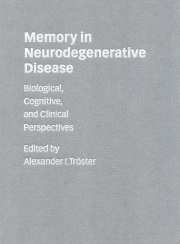Book contents
- Frontmatter
- Contents
- List of contributors
- Preface
- PART I Biological perspectives
- PART II Cognitive perspectives
- 8 The role of executive deficits in memory disorders in neurodegenerative disease
- 9 Prospective memory in aging and neurodegenerative disease
- 10 Remote memory in neurodegenerative disease
- 11 Semantic memory in neurodegenerative disease
- 12 Nondeclarative memory in neurodegenerative disease
- 13 Memory in neurodegenerative disease: what has been learned about the organization of memory?
- PART III Clinical perspectives
- Index
9 - Prospective memory in aging and neurodegenerative disease
from PART II - Cognitive perspectives
Published online by Cambridge University Press: 23 November 2009
- Frontmatter
- Contents
- List of contributors
- Preface
- PART I Biological perspectives
- PART II Cognitive perspectives
- 8 The role of executive deficits in memory disorders in neurodegenerative disease
- 9 Prospective memory in aging and neurodegenerative disease
- 10 Remote memory in neurodegenerative disease
- 11 Semantic memory in neurodegenerative disease
- 12 Nondeclarative memory in neurodegenerative disease
- 13 Memory in neurodegenerative disease: what has been learned about the organization of memory?
- PART III Clinical perspectives
- Index
Summary
INTRODUCTION
In everyday life the experience of remembering takes two forms. One is retrospective memory, which is concerned with the reconstruction of past events, the other is prospective memory, i.e. remembering to carry out an intended action in the future (Wilkins and Baddeley 1978; Meacham and Leiman 1982; Winograd 1988). In this chapter the focus is on prospective memory, which is the complex process of remembering to remember. In questionnaire studies, self-perception of prospective memory is assessed with items such as: ‘Do you find you forget appointments?’ or ‘Do you sometimes forget to give a message to someone?’ (Hermann and Neisser 1978; Bennett-Levy and Powell 1980). For most of us, lapses of memory of this kind occur from time to time, but there is evidence that prospective memory failure can be a profound problem following brain injury or dementia (Cockburn 1995; Kinsella et al. 1996). For example, in a test of practical memory skills, Knight and Godfrey (1985) found that a group of amnesic patients with Korsakoff's syndrome were never able to complete a task in which they had to follow a set of three instructions involving a visit to a clinic secretary. In practice, amnesic and demented patients have considerable problems executing any kind of prospective memory task. Despite its obvious relevance to understanding memory functioning in our daily lives, prospective memory has been little studied in the experimental literature. In both clinical and experimental research, the primary focus has been on retrospective recall.
Despite its obvious relevance to understanding memory functioning in our daily lives, prospective memory has been little studied in the experimental literature.
- Type
- Chapter
- Information
- Memory in Neurodegenerative DiseaseBiological, Cognitive, and Clinical Perspectives, pp. 172 - 183Publisher: Cambridge University PressPrint publication year: 1998
- 8
- Cited by



